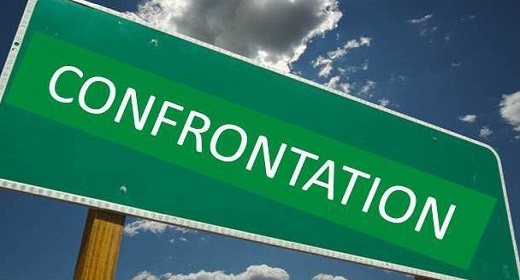A warrior…would know that the worst thing one can do is to confront human beings bluntly…

If one wants to stop our fellow men one must always be outside the circle that presses them. That way one can always direct the pressure.
Carlos Castañeda, Journey to Ixtla
I remember distinctly the moment I first read Castaneda’s warning decades ago about confronting other people. I instantly recognized myself as a person who often confronted others bluntly when I wanted them to change something.
If warriors don’t confront, I wasn’t a warrior.
Like many healthy boys growing up, I had plenty of male models and coaches to help me develop physical and mental aggression. There was football and the joy of testing my mettle by banging my body into other bodies to move them or to stop them. There was wrestling and its one-on-one confrontation, with victory going to the greater strength, skill, and determination. There was boxing with its fierce hitting in order to dominate. My dad coached me about fistfights, “If you hit a guy, make sure he doesn’t get up.”
Later, my predilection for confrontation would play out at work and in marriages. In my first professional jobs in education and social work, I tested the patience of my superiors by confronting them about organizational policies and procedures I didn’t like. My bosses came to see me as trouble, a competent but somewhat difficult employee. When I finally rose into a top leadership position myself—now setting policy and procedures—I had to learn to be much less confrontational and more strategic.

In marriages, my confrontational approach to disagreements fueled fiery battles and plenty of emotional turmoil with wives who were just as confrontational. Over time I learned how to be more artful when disagreements arose, and for most of my twenty-plus years with Mary have pretty much eschewed confrontation in favor of loving listening and gentle negotiation.
But I still have work to do on confrontation, I discovered to my chagrin recently. As a volunteer in a community organization the past few months, I saw that the agency is mismanaged, careless, and ineffective in some of its key responsibilities. Its staff seem overwhelmed, tired, and poorly led. Public resources are being wasted. The potential of the agency is submerged by incompetence and bad faith.
In my every contact with the agency, I find myself wanting to confront—to expose the incompetence, to clean house, to initiate reform. I have confronted organizational leaders in what I thought was a quiet, respectful way, but they hear my critique and have already declined my offer to serve on their Board of Directors. Because I have confronted their weaknesses directly, they have found a way to nudge me out. My confrontation has caused me to miss my chance to influence some needed organizational change.
In another recent situation, I confronted a friend about her self-indulgent anger tantrums, saying impatiently, “Isn’t it time for you to grow up?” She stopped acting out when she is around me, but our relationship has cooled. I’m stuck with repairing the damage I’ve done with my blunt critique. She is likely to be careful around me from now on—a mistrust I have earned.
I need to keep reminding myself: warriors don’t confront in order to change or stop other people.
Confrontational damage
We may convince ourselves that confrontation is the righteous response for progress, justice, truth and self-preservation. Shouldn’t evil be confronted by decent, caring people like us?
Well, yes, we want to pursue progress, justice, truth, and self-preservation.
But confrontation doesn’t work because it is the result of a bad explanation for reality. The bad explanation underlying confrontation includes these elements:
- Other people sometimes must be changed or stopped.
- My anger about what is happening is justified, proving that I care and that I take responsibility.
- My judgment of another person or other people is warranted.
- Somebody is doing something to me (us), so I must go to battle.
Bad explanation: Other people sometimes must be changed or stopped. This may not be true, no matter how strongly you believe it’s true. Your 17 year old wants to quit school to sing in a band. She may be tuned into her life purpose and your desire to stop her may only damage her and damage your relationship. Maybe you’re the one who must change.
Bad explanation: My anger about what is happening is justified, proving that I care and that I take responsibility. Your anger just means that your self-importance has been pricked by what is happening. If you are reacting to an injustice, you may feel that your anger is righteous. But righteousness is all ego, a false effort to make your confrontation appear to be a caring act. Your angry posturing is more about you than about any injustice.
Bad explanation: My judgment of another person or other people is warranted. Judgement is always part of the argument for confrontation. Since judgement asserts your superiority over others, you will be convinced that you see clearly—that you must confront people who are headed down a bad path. But judgement guarantees that you are not seeing clearly.
Bad explanation: Somebody is doing something to me (us), so I must go to battle.
Nobody is doing anything to anybody, let alone to a warrior, as Castaneda says. It’s a great temptation to confront people who seem to be disrespectful to you, to confront people who betray you, or to confront people who actually want to damage you or even kill you.
Shouldn’t I confront a sexual predator who is coming at me, for instance? No, confronting petty tyrants is dangerous, and you can’t predict how your battle will turn out.

A warrior handles petty tyrants without direct confrontation: instead the warrior avoids becoming a victim by taking responsibility for what is happening and acting accordingly. Petty tyrants have to be handled with subtle and creative strategies. Confronting them usually turns a challenge into an unsolvable problem. Cruel or careless people are merely a challenge to a warrior.
Confrontation doesn’t work. Confrontation makes things worse, no matter what our ego argues.
How to stop our fellow men
OK, no more confrontation, but we may still want to influence the behavior of other people when change is needed or required.
We will be able to figure out how to be “always be outside the circle that presses them,” as Castaneda advises, but only if we sustain our poise.
Feeling the urge to confront, we check out our poise:
Are we operating in the present, or are we fixated on the past—some past insult or injury? Are we noticing all the wonders of the present moment, or are we roiling over some old (like a few minutes ago) injury? Take a breath: right now is the only reality we have to live in. Let’s get back to the present.
Are we staying connected to others, to this beautiful earth, and to our own values? If we’re feeling wounded by someone, we feel separate, the default position when our ego feels disrespected. It’s time to take everything in our life into our embrace.
Are we grateful? Poised, we know we have everything we need, no matter what challenges are facing us. Half-crazy and confronting others about their failings, we’re convinced that we don’t have what we need and want. Let’s retrieve our poise, where our cups are filled to the brim and anything you give us is more than we can take.
Are we creative when we confront? No, our confrontations are blunt and crude. Changing or stopping others is an art form. Poised, we’ll be able to discover artistic strategies for dealing with difficult people.
Are we lighthearted when we confront someone who is bugging us—or worse, harming us? Remaining lighthearted in the face of petty tyrants, for instance, is a supreme achievement requiring the most generous of spirits. Poised, we can detach ourselves from the stolid earnestness of our ego’s demands for confrontation and laugh at ourselves.
This warrior is talking to himself: warriors don’t confront.
















































